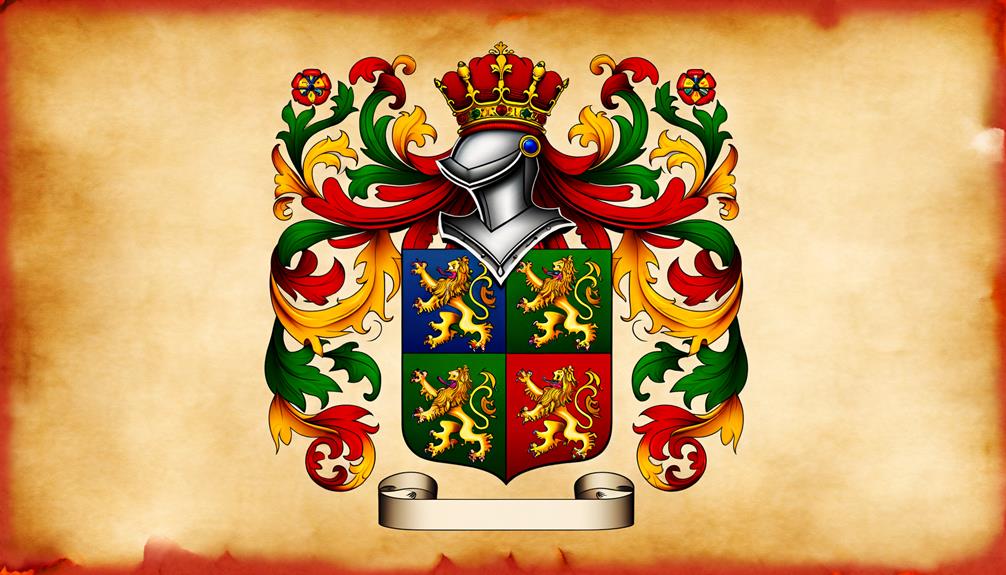Sanders Name Meaning and Origin
The Sanders surname originates from the medieval given name 'Sander,' a diminutive form of 'Alexander.' Derived from the Greek 'Alexandros,' it translates to 'defender of the people.' Post-Norman Conquest, the suffix '-s' indicated ‘son of,' forming hereditary surnames. Rooted in ancient Germanic tribes and influenced by socio-religious dynamics of medieval Europe, the Sanders name evolved through migration and linguistic changes.
These adaptations reveal a rich cultural tapestry influenced by historical events and prominent figures. Discover how notable personalities and evolving societal contexts have shaped the lasting impact of the Sanders surname.

Key Takeaways
- The Sanders surname originates from the medieval given name 'Sander,' a diminutive of 'Alexander.'
- Alexander, derived from 'Alexandros,' means 'defender of the people.'
- The suffix '-s' in 'Sanders' indicates 'son of,' denoting lineage.
- Post-Norman Conquest, surnames like Sanders became hereditary for identification.
- Sanders has historical roots in early European societies and ancient Germanic tribes.
Etymology of Sanders
The surname Sanders, often encountered across various English-speaking regions, originates from the medieval given name 'Sander,' a diminutive form of 'Alexander.'
The name Alexander itself has Greek origins, coming from 'Alexandros,' which means 'defender of the people.'
In medieval Europe, diminutive forms like Sander were common, especially for names of significant cultural or religious importance.
The shift from 'Sander' to 'Sanders' follows a typical pattern in surname formation, where the suffix '-s' indicates 'son of,' showing lineage.
This etymological progression reflects broader naming conventions of the time, where personal names evolved into hereditary surnames, a practice solidified by the Norman Conquest of England in 1066.
Consequently, Sanders became a proof of familial heritage and identity.
Historical Background
The historical roots of the surname Sanders can be traced back to early European societies. It often signified a connection to the given name Alexander. Throughout the Middle Ages, the name proliferated across various regions. This spread was facilitated by patterns of migration and socio-economic shifts.
The movement of people due to trade, wars, and the search for better living conditions further influenced this spread.
Early European Roots
Often tracing back to medieval England, the Sanders surname has its origins intertwined with the ancient Germanic tribes and the spread of Christianity across Europe.
The name is derived from the given name Sander, a diminutive of Alexander, which itself has Greek origins meaning 'defender of the people.'
The early European roots of the Sanders name can be traced to the Saxons, a Germanic tribe that settled in England during the early Middle Ages.
With the Christianization of Europe, the name Alexander became popularized, leading to various diminutive forms like Sanders.
The surname subsequently evolved through the socio-political changes of feudal England, reflecting the linguistic influences of both the Norman Conquest and the evolving English language.
Migration and Spread
As the Sanders surname solidified its presence in medieval England, its bearers began to disperse across Europe and beyond, influenced by the continent's dynamic migratory patterns and historical events.
The Norman Conquest of 1066, Crusades, and subsequent trade routes facilitated the movement of families, including those bearing the Sanders name.
The Protestant Reformation and religious conflicts of the 16th and 17th centuries further propelled migrations, leading Sanders families to seek new opportunities in more tolerant regions.
The advent of the Age of Exploration saw Sanders descendants venturing to the Americas, Australia, and other colonies, contributing to the global spread of the surname.
Each migratory wave left an indelible mark, diversifying and expanding the Sanders lineage worldwide.
Greek Origins
The Greek origins of the name Sanders are rooted in the etymological evolution of the name Alexander, which translates to 'defender of the people' in ancient Greek.
Historically, this name gained prominence through figures such as Alexander the Great, whose extensive conquests and cultural impact solidified its significance.
Culturally, the adaptation of Alexander into various forms, including Sanders, underscores the enduring resonance of Greek influence on Western nomenclature.
Etymological Background
Derived from the Greek name 'Alexander,' the surname Sanders traces its etymological roots back to the ancient Greek word 'Alexandros,' which translates to 'defender of men.' This name underwent several transformations across different languages and cultures before settling into its current form.
Key linguistic evolutions include:
- Greek to Latin: 'Alexandros' became 'Alexander.'
- Old French Influence: The name evolved to 'Alisandre.'
- Anglicization: In medieval England, it morphed into 'Sanders.'
- Phonetic Simplification: Over time, 'Sanders' became a common surname.
These transformations highlight the surname's rich linguistic journey, reflecting historical interactions and cultural exchanges.
The etymological lineage of Sanders underscores its profound historical and linguistic significance, tracing back to ancient civilizations.
Historical Context
Rooted in ancient Greek civilization, the name 'Alexandros' epitomizes the cultural and historical milieu of a society that highly valued the concept of heroism and protection. This name, derived from 'alexein' (to defend) and 'aner' (man), reflects a societal emphasis on martial prowess and guardianship.
Remarkably, 'Alexandros' is famously associated with Alexander the Great, whose conquests and statesmanship left an indelible mark on the ancient world. The prominence of the name underscores the Greeks' reverence for leaders who embodied both physical strength and strategic acumen.
This historical context provides a backdrop for understanding how the name evolved across time, eventually morphing into variants such as 'Sanders' through linguistic and cultural transformations.
Cultural Significance
In examining the cultural significance of Greek origins, one finds that the name 'Alexandros' not only encapsulates values of heroism and protection but also serves as a tribute to the societal valorization of martial excellence and strategic leadership. The name, derived from the Greek 'alexein' (to defend) and 'aner' (man), reflects pivotal elements of ancient Greek culture.
The prominence of the name is underscored by:
- Historical Figures: Alexander the Great, a paragon of military genius.
- Mythological Heroes: Paris of Troy, also named Alexandros.
- Cultural Symbolism: Representing strength and leadership in Greek lore.
- Literary Influence: Frequent use in epic poetry and classical literature.
These factors collectively emphasize the enduring legacy of 'Alexandros' in shaping cultural narratives.
Medieval Influence
The surname Sanders traces its origins back to medieval times, when surnames began to emerge as a means of distinguishing individuals within growing communities and complex feudal systems. During this period, surnames often derived from personal names, occupations, or geographical locations.
The name Sanders is rooted in the given name Alexander, a popular choice across Europe due to its association with Alexander the Great. The patronymic form 'Sanders' implies 'son of Alexander,' highlighting its familial lineage.
The emergence of surnames like Sanders was crucial for administrative purposes, including tax collection and legal documentation. This era's feudal structure necessitated clear identification, thereby fostering the development of hereditary surnames that have persisted through centuries, maintaining historical continuity.
Cultural Adaptations
Frequently, the surname Sanders has undergone various cultural adaptations as it migrated across different regions and linguistic landscapes, reflecting the dynamic interplay between language and identity over time. These adaptations illustrate the surname's capacity to integrate into diverse cultural milieus while retaining its core identity.
Key cultural transformations include:
- Anglicization: In Britain, the original Dutch or German 'Zanders' often became 'Sanders.'
- Americanization: Upon arrival in the United States, Sanders was sometimes altered to fit phonetic patterns familiar to English speakers.
- Colonial Influence: In regions like South Africa, British colonial rule led to the adoption of Sanders, supplanting local surnames.
- Linguistic Shifts: In non-English speaking countries, Sanders was adapted to align with local phonetic and linguistic norms.
These shifts underscore the surname's historical versatility.
Notable Sanders Figures
Among the notable figures bearing the surname Sanders, several individuals have made significant contributions across various fields, including politics, entertainment, and academia, thereby highlighting the diverse impact of this lineage.
In politics, Senator Bernie Sanders has become a prominent advocate for progressive policies in the United States. His influence extends beyond legislation, shaping contemporary discourse on social and economic justice.
In the entertainment sector, actor and comedian Larry Sanders, portrayed by Garry Shandling in 'The Larry Sanders Show,' revolutionized television comedy with its behind-the-scenes look at late-night talk shows.
Academically, Dr. Ronald Sanders has made groundbreaking contributions to anthropology, particularly in the study of African cultures. These figures exemplify the varied domains where the Sanders name has left an indelible mark.
Modern-Day Significance
In what ways does the Sanders surname continue to influence contemporary society through its bearers' contributions to various professional domains? The name Sanders remains prominent due to the significant achievements of individuals across various fields. Their impact is seen in multiple spheres:
- Politics: Bernie Sanders, a U.S. Senator, has been a leading voice in progressive politics, advocating for social and economic reforms.
- Entertainment: Barry Sanders, an NFL Hall of Famer, has left an indelible mark on professional football.
- Business: Colonel Harland Sanders, the founder of Kentucky Fried Chicken (KFC), revolutionized the fast-food industry.
- Academia: Ronald Sanders, a notable historian, has contributed extensively to the understanding of Jewish history and culture.
These contributions underscore the lasting influence of the Sanders surname in modern society.
Conclusion
The name Sanders exhibits a rich etymological history, tracing its roots from Greek origins through medieval influence and cultural adaptations. The name Sanders is believed to have originally derived from the Greek name Alexandros, meaning “defender of men.” Over time, the name spread throughout Europe, taking on various forms and spellings as it was adapted to different languages and dialects. The scott name history of Sanders can be traced back to the medieval period, where it became associated with individuals who were the sons of a man named Sander. This familial association has led to the name’s continued use and significance in modern times.
Significantly, the surname stands as the 1,209th most common in the United States, reflecting its widespread adoption.
The historical progression and cultural significance of the name have been shaped by numerous prominent figures.
The modern-day relevance of Sanders underscores its enduring legacy, influenced by centuries of linguistic and societal transformations.






